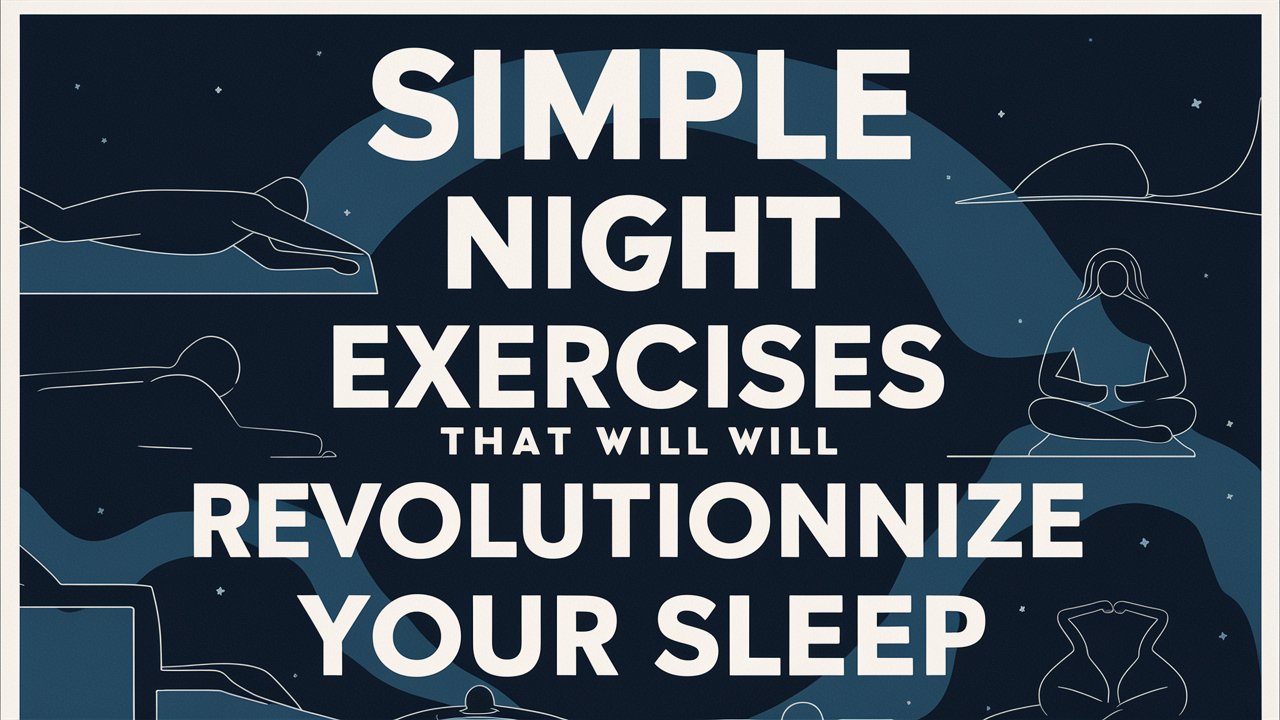Simple Night Exercises : Quality sleep is a crucial aspect of overall health and well-being. A recent study has highlighted the benefits of incorporating quick, easy exercises into your nightly routine to improve sleep quality. This comprehensive guide will explore the types of exercises that are most effective, the science behind how they work, and practical tips for integrating them into you life.
Types and Categories

Cardio Exercises
Cardio exercises are a great way to get your heart rate up and burn off excess energy before bed. Light jogging or even a few minutes of jumping jacks can help to tire your body out and prepare it for rest.
Strength Training
Strength training exercises, such as bodyweight exercises or using resistance bands, can also be beneficial. These exercises not only help to build muscle but also promote relaxation as your muscles recover.
Flexibility and Stretching
Stretching exercises, particularly yoga poses and static stretching, are excellent for winding down at the end of the day. They help to relieve muscle tension and promote a sense of calm.
Relaxation Techniques
Relaxation techniques, such as deep breathing exercises and progressive muscle relaxation, are crucial for reducing stress and preparing your mind and body for sleep. These techniques can be done easily while watching TV or before bed.
Symptoms and Signs of Poor Sleep
Common Symptoms
Poor sleep can lead to a variety of common symptoms, including fatigue and difficulty concentrating. These symptoms can significantly impact your daily life and productivity.
Uncommon Symptoms
In addition to common symptoms, poor sleep can also result in less obvious issues, such as weight gain and skin problems. These symptoms may not be immediately linked to sleep but can improve with better sleep quality.
Causes and Risk Factors
Biological Factors
Biological factors, such as hormonal imbalances and genetic predispositions, can affect sleep quality. Understanding these factors can help in identifying potential solutions.
Environmental Factors
Environmental factors, including noise pollution and light exposure, play a significant role in sleep quality. Creating a conducive sleep environment is essential for restful sleep.
Lifestyle Factors
Lifestyle choices, such as diet and exercise habits, also impact sleep. Making positive changes in these areas can greatly enhance sleep quality.
Diagnosis and Tests
Sleep Studies
Sleep studies, such as polysomnography and actigraphy, are valuable tools for diagnosing sleep disorders. These tests provide detailed information about sleep patterns and can guide treatment options.
Medical Examinations
Medical examinations, including blood tests and physical exams, can help identify underlying health issues that may be affecting sleep. Consulting a healthcare professional is an important step in addressing sleep problems.
Treatment Options
Medical Treatments
For those struggling with severe sleep issues, medical treatments such as prescription medications or over-the-counter sleep aids may be necessary. These should always be used under the guidance of a healthcare professional.
Therapies
Therapies like cognitive-behavioral therapy for insomnia (CBT-I) and light therapy have proven effective in treating sleep disorders. These therapies address the root causes of sleep issues and promote long-term improvements.
Lifestyle Adjustments
Making lifestyle adjustments, such as establishing a consistent sleep schedule and creating a relaxing bedtime routine, can have a significant impact on sleep quality. These changes help signal to your body that it is time to wind down and prepare for sleep.
Preventive Measures
Tips and Strategies
Preventive measures, including limiting caffeine intake and reducing screen time before bed, can help improve sleep quality. These strategies are easy to implement and can make a big difference in how well you sleep.
Personal Stories or Case Studies About Night Exercises
Case Study 1: Jane’s Experience
Jane struggled with sleep issues for years. After incorporating nightly exercises into her routine, she noticed a significant improvement in her sleep quality. Jane found that light cardio exercises, followed by stretching, helped her relax and fall asleep more easily.
Case Study 2: John’s Journey
John suffered from chronic insomnia and had tried various treatments with limited success. By incorporating relaxation techniques, such as deep breathing exercises and progressive muscle relaxation, John was able to reduce his stress levels and improve his sleep.
Expert Insights
Dr. Smith’s Advice
Dr. Smith emphasizes the importance of physical activity for overall health and sleep quality. He recommends incorporating a mix of cardio, strength training, and flexibility exercises into your nightly routine.
Expert Opinion: Dr. Johnson
Dr. Johnson highlights the role of relaxation in promoting better sleep. She suggests techniques such as deep breathing exercises and progressive muscle relaxation as effective ways to unwind before bed.
Incorporating quick and easy exercises into your nightly routine can significantly improve your sleep quality. By understanding the types of exercises that are beneficial and following expert advice, you can enhance your overall well-being and enjoy a restful night’s sleep
Prevent Knee Pain: 5 Simple Exercises You Can Do at Home
14 Reasons to Start Strength Training Today: Health Benefits Backed by Science

2 thoughts on “Simple Night Exercises That Will Revolutionize Your Sleep”